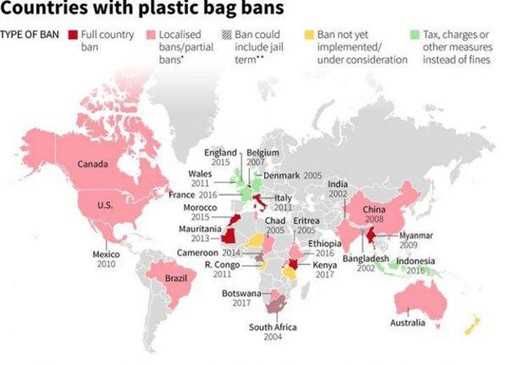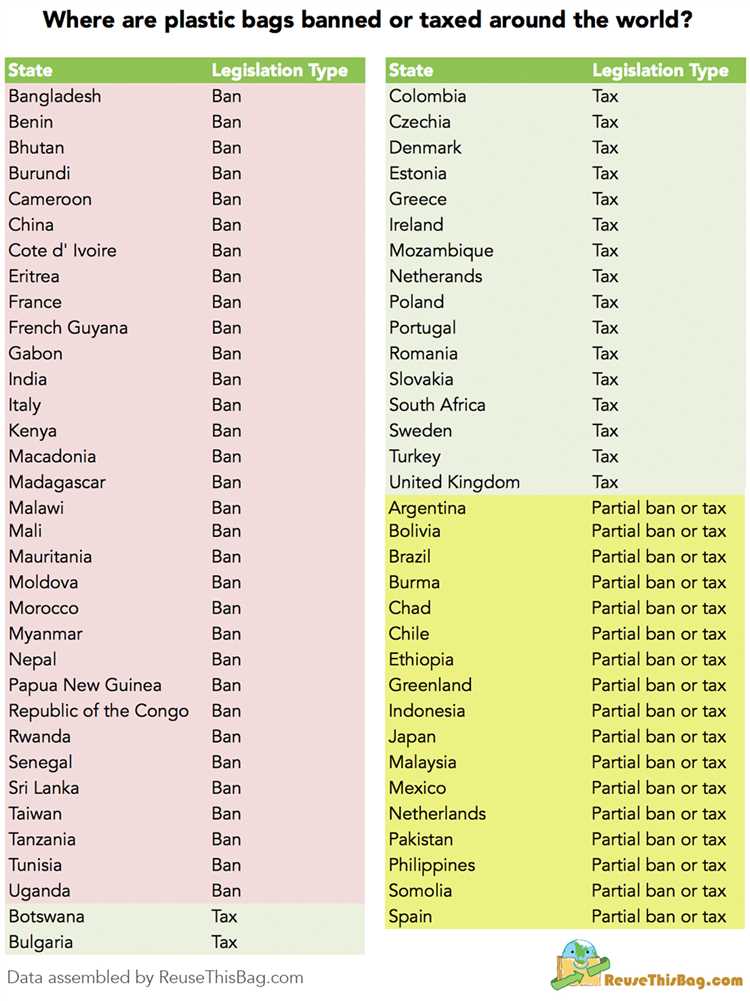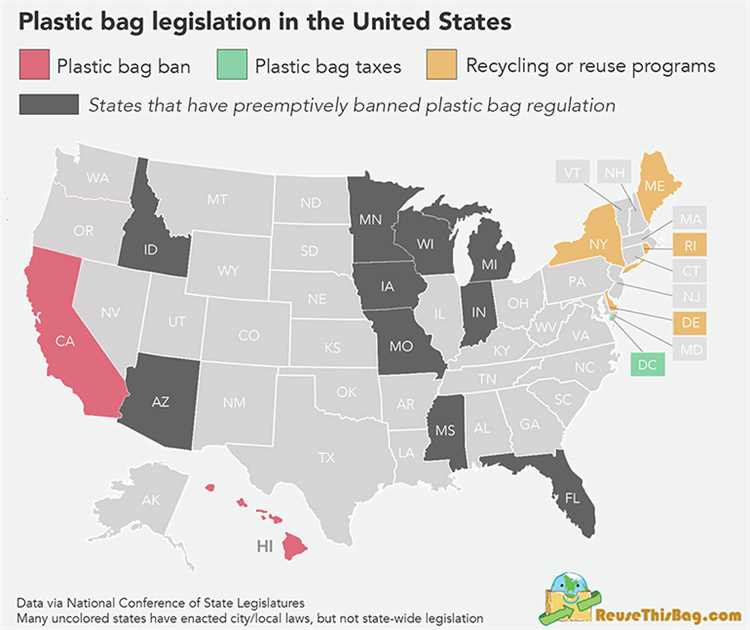
Plastic bags have become a ubiquitous part of our daily lives. They are lightweight, convenient, and cheap, which has made them the go-to choice for many retailers around the world. However, the environmental impact of plastic bags has become a growing concern. These bags take hundreds of years to decompose, contributing to pollution and endangering wildlife. As a result, many cities, countries, and regions have taken action to ban or restrict the use of plastic bags in an effort to protect the planet.
One of the first places to ban plastic bags was Bangladesh. In 2002, the country enforced a nationwide ban on the production, import, sale, and use of plastic bags. This was in response to the devastating floods that occurred in the late 1990s, which were partly caused by plastic bags clogging drains and exacerbating the effects of heavy rains. The ban has been successful in reducing plastic pollution and is considered a model for other countries.
In 2008, San Francisco became the first city in the United States to ban plastic bags. The ban, which was later expanded to include all retail stores and restaurants, aimed to reduce the estimated 180 million plastic bags used each year in the city. This bold move sparked a movement, and many other cities and states in the US followed suit. Today, plastic bag bans or fees are in place in numerous states, including California, Hawaii, and New York.
Another notable example is Rwanda, which banned plastic bags in 2008. The government implemented strict regulations and penalties for the production, sale, and use of plastic bags. This initiative has made Rwanda one of the cleanest countries in Africa, with citizens taking pride in their clean streets and landscapes. Other African countries, such as Kenya and Morocco, have since followed Rwanda’s lead and implemented their own plastic bag bans.
These are just a few examples, but there are many other places that have taken action to ban or limit the use of plastic bags. From countries like China and India to cities like Seattle and Vancouver, the movement against plastic bags continues to gain momentum. The goal is not only to reduce plastic waste, but also to raise awareness about the importance of sustainable alternatives and the need for a global effort to protect our planet.
- Top 6 Countries That Have Banned Plastic Bags
- France: A Pioneer in Plastic Bag Ban
- Italy: Taking a Stand Against Plastic
- Reasons for the Ban
- Impact of the Ban
- Kenya: Leading the Way in Africa
- The Impact of the Ban
- Challenges and Future Steps
- Bangladesh: A Success Story in Plastic Bag Reduction
- The Impact of the Ban
- Lessons Learned and Global Influence
- Australia: Aiming for a Cleaner Future
- The Plastic Bag Ban
- The Impact
- Taiwan: Striving for a Plastic-Free Environment
- The Importance of Education and Awareness
- The Impact on the Environment
- Question-Answer
- Which countries have banned plastic bags?
- Are there any US states that have banned plastic bags?
- Why have these places banned plastic bags?
- What alternative options are available in these places that have banned plastic bags?
Top 6 Countries That Have Banned Plastic Bags
Plastic bags have become a major environmental problem worldwide due to their non-biodegradable nature. Many countries have recognized the harmful effects of plastic bags and have taken steps to ban their use. Here are the top 6 countries that have successfully implemented a ban on plastic bags:
| Country | Ban Implementation |
|---|---|
| Kenya | In 2017, Kenya implemented one of the strictest plastic bag bans in the world. Anyone found using, producing, or selling plastic bags can face fines or even imprisonment. |
| Morocco | Morocco banned plastic bags in 2016 and has since seen a significant reduction in plastic waste. The country has also implemented an awareness campaign to promote the use of reusable bags. |
| Rwanda | Rwanda imposed a complete ban on non-biodegradable plastic bags in 2008. The country has embraced alternatives like paper bags and banana leaves for packaging. |
| China | China banned the production, sale, and use of ultra-thin plastic bags in 2008. The ban has been successful in reducing plastic waste and promoting the use of reusable bags. |
| Bangladesh | Bangladesh was one of the first countries to impose a ban on plastic bags in 2002. The government implemented the ban as plastic bags were clogging drainage systems and causing major floods. |
| France | France implemented a ban on plastic bags in 2016, aiming to reduce plastic consumption and promote the use of eco-friendly alternatives. The ban includes both single-use plastic bags and plastic packaging for fruits and vegetables. |
These countries serve as examples for others to follow in the fight against plastic pollution. By implementing plastic bag bans, they have shown a commitment to protecting the environment and encouraging sustainable practices.
France: A Pioneer in Plastic Bag Ban
France has been a pioneer in the movement to ban plastic bags. The country implemented a nationwide ban on single-use plastic bags in July 2016, becoming one of the first countries in the world to do so. The ban applies to all plastic bags, including those used in supermarkets, shops, and other retail outlets.
The French government took this bold step to address the environmental issues caused by plastic bags. Plastic bags are known for their detrimental impact on marine life, as they can take hundreds of years to break down and often end up in oceans and rivers. By implementing the ban, France aimed to reduce plastic pollution and promote more sustainable alternatives.
The ban has resulted in significant changes in consumer behavior and retail practices. Customers have had to adapt to bringing their own reusable bags when shopping, or they can purchase reusable bags made of cloth or other eco-friendly materials. Many supermarkets have also implemented measures to provide alternatives to single-use plastic bags, such as offering paper bags, cardboard boxes, or selling reusable bags at a nominal cost.
Since the ban was implemented, there has been a noticeable decrease in the use of plastic bags in France. According to a report by the French Ministry of Ecology, the consumption of plastic bags dropped by over 80% in the months following the ban. This reduction has had a positive impact on the environment, as it has helped to reduce plastic waste and minimize the threat to wildlife.
The success of the plastic bag ban in France has inspired other countries and regions to follow suit. Many European countries, including Italy, Ireland, and the United Kingdom, have implemented their own bans or introduced fees on plastic bags in response to France’s example. The ban in France has also encouraged more public awareness and support for measures to reduce plastic waste and promote sustainability.
Overall, France’s pioneering ban on plastic bags has been a significant step forward in the global effort to combat plastic pollution. By taking resolute action, France has demonstrated that it is possible to make a positive impact on the environment and inspire change on a national and international scale.
Italy: Taking a Stand Against Plastic
Italy is one of the countries that has taken a strong stand against plastic by banning the use of plastic bags. The government enacted a law in 2011 that prohibits the distribution of single-use plastic bags to customers.
The ban on plastic bags in Italy has been effective in reducing the country’s plastic waste. According to a report by the Ministry of the Environment, the amount of plastic bags used in Italy has decreased by 50% since the introduction of the ban.
Reasons for the Ban
The ban on plastic bags in Italy was implemented to combat the negative environmental impact of plastic waste. Plastic bags are non-biodegradable and take hundreds of years to decompose. They also pose a serious threat to wildlife, as animals often mistake plastic bags for food, leading to injury or death.
In addition to the environmental concerns, the ban on plastic bags in Italy also aims to promote responsible consumer behavior. By encouraging the use of reusable bags, the government hopes to instill a culture of sustainability and reduce the consumption of single-use plastics.
Impact of the Ban
The ban on plastic bags in Italy has had a positive impact on the environment. It has reduced the amount of plastic waste generated by the country and has also contributed to a decrease in marine pollution. Additionally, the ban has encouraged the development and use of alternative eco-friendly materials for packaging.
Consumers in Italy have adapted to the ban by using reusable shopping bags made of cloth, jute, or other biodegradable materials. Retailers have also made changes by offering alternative options such as paper bags or encouraging customers to bring their own bags.
The success of Italy’s ban on plastic bags has served as an example for other countries. Many nations have implemented similar bans or are considering doing so in order to reduce their plastic waste and protect the environment.
Kenya: Leading the Way in Africa
Kenya is setting an example for other African countries by taking the lead in banning plastic bags. In 2017, Kenya implemented one of the world’s strictest bans on plastic bags, outlawing the production, sale, and use of single-use plastic bags. This move has made Kenya a leader in the fight against plastic pollution in Africa.
The ban was a necessary step for Kenya, as plastic bags had become a major environmental issue in the country. Plastic bags littered the streets, clogged drains, and posed a threat to wildlife and aquatic life. By banning plastic bags, Kenya is working towards reducing pollution and protecting its natural resources.
The Impact of the Ban
The ban on plastic bags has had a significant impact on the country. It has led to a decrease in plastic waste and a cleaner environment. The ban has also created opportunities for alternative eco-friendly materials and packaging options, promoting innovation and sustainability.
Kenya’s ban on plastic bags has inspired other African countries to follow suit. Several countries, including Rwanda and Morocco, have implemented similar bans. Kenya’s leadership in this area demonstrates the country’s commitment to preserving its environment and motivating others in the region to do the same.
Challenges and Future Steps
Implementing and enforcing the ban on plastic bags has not been without challenges. Initially, there was resistance from some sectors of the economy, as plastic bags were commonly used in various industries. However, with time, businesses and consumers have adjusted to the ban and found alternative solutions.
Going forward, Kenya plans to continue promoting sustainable practices and implementing policies to further reduce plastic pollution. The government is working on initiatives to educate the public about the dangers of plastic and the importance of recycling. It is also exploring options for recycling and proper waste management systems to handle the existing plastic waste in the country.
Overall, Kenya’s effort to ban plastic bags and its commitment to sustainability make it a leader in Africa. The country serves as an inspiration for others to take action and adopt similar measures to protect the environment and preserve natural resources.
Bangladesh: A Success Story in Plastic Bag Reduction
Bangladesh has become a shining example of success in reducing the use of plastic bags. In 2002, the government implemented a strict ban on plastic bags due to their harmful impact on the environment.
The ban was met with initial resistance from both businesses and consumers, as plastic bags were a common and convenient commodity. However, the government was determined to protect the environment and promote sustainable practices.
To ensure the success of the ban, Bangladesh implemented strict penalties for both the production and use of plastic bags. Those found violating the ban would face fines and potential imprisonment.
The Impact of the Ban
The ban on plastic bags in Bangladesh has had a significant positive impact on the environment. The country has seen a decrease in plastic waste, which is not only beneficial for the overall cleanliness and aesthetic appeal but also for the preservation of wildlife and marine life.
Furthermore, the ban has created opportunities for alternative solutions. The demand for reusable bags made from eco-friendly materials such as jute and cotton has increased, providing economic opportunities for local artisans and businesses.
Lessons Learned and Global Influence
Bangladesh’s success in reducing plastic bag usage holds valuable lessons for other countries struggling with plastic waste management. The strict implementation of penalties, along with the promotion of sustainable alternatives, has shown that change is possible.
Many countries around the world have been inspired by Bangladesh’s success story and have implemented similar policies to reduce plastic bag usage. These efforts are a crucial step towards tackling the global plastic pollution problem.
| Key Takeaways from Bangladesh’s Success: |
|---|
| 1. Strict penalties are effective in reducing plastic bag usage |
| 2. Encouraging the use of eco-friendly alternatives promotes sustainable practices |
| 3. Collaboration between government, businesses, and consumers is necessary for success |
| 4. Other countries can learn from Bangladesh’s example and implement similar policies |
Australia: Aiming for a Cleaner Future
Australia is one of the countries leading the charge when it comes to banning plastic bags. With the goal of creating a cleaner and more sustainable future, the country has taken decisive action to reduce plastic waste.
The Plastic Bag Ban

In 2018, major Australian supermarkets, including Coles and Woolworths, banned single-use plastic bags. This move was met with mixed reactions from the public, but it was a significant step towards reducing plastic waste.
During the transition period, customers were encouraged to bring their own reusable bags or purchase reusable bags at the checkout. The ban was met with some resistance initially, but many Australians have now embraced the change and adopted more sustainable shopping practices.
The Impact

The ban on plastic bags has had a positive impact on the environment. According to reports, the number of plastic bags used in Australia has decreased significantly since the ban was implemented. This has resulted in less plastic waste ending up in landfills and waterways, reducing the harm caused to wildlife and ecosystems.
Additionally, the ban has raised awareness about the importance of reducing plastic consumption. It has encouraged individuals to think more critically about their everyday choices and make more sustainable decisions.
Looking Ahead
Australia’s ban on plastic bags is just one step towards a cleaner future. The country continues to explore other measures to reduce plastic waste, such as promoting the use of reusable containers and encouraging the development of innovative alternatives to plastic products.
By taking a proactive stance against plastic waste, Australia is setting an example for the rest of the world and showing that change is possible.
Taiwan: Striving for a Plastic-Free Environment
Taiwan is making significant strides in its efforts to create a plastic-free environment. In 2003, Taiwan became one of the first countries in the world to implement a ban on free plastic bags in supermarkets and convenience stores. This was done in an effort to reduce the amount of plastic waste that was polluting the environment and harming wildlife.
Since then, Taiwan has continued to take steps to further reduce its plastic consumption. In 2018, the government implemented a ban on single-use plastic straws at food and beverage outlets. This move was met with some resistance initially, but has since been widely accepted and embraced by both businesses and consumers.
The Importance of Education and Awareness
One of the keys to Taiwan’s success in reducing plastic waste has been its focus on education and awareness. Schools, communities, and organizations across the country have been actively involved in promoting the importance of reducing plastic consumption and the effects of plastic pollution on the environment.
Taiwan has also invested in infrastructure to support its plastic-free initiatives. Public recycling bins are widely available and clearly marked, making it easy for individuals to separate and dispose of their waste properly. In addition, the government has introduced a system where citizens can earn points for recycling, which can then be redeemed for rewards.
The Impact on the Environment
The efforts made by Taiwan to minimize plastic consumption have had a positive impact on the environment. The ban on free plastic bags alone has resulted in a significant reduction in plastic waste. The use of reusable bags has become commonplace, and consumers have become more conscious of their plastic consumption habits.
Furthermore, the ban on single-use plastic straws has also made a significant difference. Alternatives like paper or metal straws have become more readily available, and consumers have adapted to using them. This has helped to reduce the amount of plastic waste, particularly in the food and beverage industry.
Taiwan’s commitment to creating a plastic-free environment serves as an inspiration to other countries and communities seeking to reduce plastic waste. By implementing innovative strategies and fostering a culture of awareness and education, Taiwan has made significant progress towards its goal of a plastic-free future.
Question-Answer
Which countries have banned plastic bags?
Many countries have banned plastic bags, including Kenya, Rwanda, Bangladesh, and China.
Are there any US states that have banned plastic bags?
Yes, there are several US states that have banned plastic bags, including California, Hawaii, and New York.
Why have these places banned plastic bags?
These places have banned plastic bags to reduce pollution and protect the environment. Plastic bags are harmful to wildlife and take hundreds of years to decompose.
What alternative options are available in these places that have banned plastic bags?
In places that have banned plastic bags, people are encouraged to use reusable bags, such as cloth bags or tote bags, for their shopping needs. Some places also provide paper bags as an alternative.